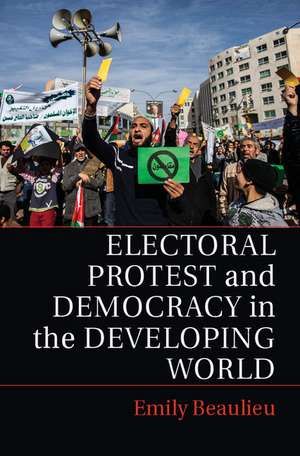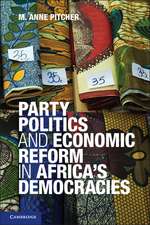Electoral Protest and Democracy in the Developing World
Autor Emily Beaulieuen Limba Engleză Paperback – 9 mar 2014
| Toate formatele și edițiile | Preț | Express |
|---|---|---|
| Paperback (1) | 206.88 lei 6-8 săpt. | |
| Cambridge University Press – 9 mar 2014 | 206.88 lei 6-8 săpt. | |
| Hardback (1) | 630.26 lei 6-8 săpt. | |
| Cambridge University Press – 9 mar 2014 | 630.26 lei 6-8 săpt. |
Preț: 206.88 lei
Nou
Puncte Express: 310
Preț estimativ în valută:
39.59€ • 41.23$ • 33.46£
39.59€ • 41.23$ • 33.46£
Carte tipărită la comandă
Livrare economică 11-25 martie
Preluare comenzi: 021 569.72.76
Specificații
ISBN-13: 9781107612273
ISBN-10: 1107612276
Pagini: 238
Ilustrații: 6 b/w illus. 8 tables
Dimensiuni: 153 x 228 x 14 mm
Greutate: 0.3 kg
Ediția:New.
Editura: Cambridge University Press
Colecția Cambridge University Press
Locul publicării:New York, United States
ISBN-10: 1107612276
Pagini: 238
Ilustrații: 6 b/w illus. 8 tables
Dimensiuni: 153 x 228 x 14 mm
Greutate: 0.3 kg
Ediția:New.
Editura: Cambridge University Press
Colecția Cambridge University Press
Locul publicării:New York, United States
Cuprins
1. Introduction; 2. Elite bargaining and developing world elections; 3. Causes of electoral protest; 4. Election day and its aftermath; 5. Democratic consequences of electoral protest; 6. Conclusion; Appendix A. Data and robustness; Appendix B. Boycotts; Appendix C. Demonstrations; Appendix D. Reforms.
Recenzii
'In this book, Beaulieu proposes and tests an important new theory of why authoritarian leaders agree to hold more or less competitive elections, and why such processes sometimes descend into protests and reversals. It is a story of problems for incumbents to make credible commitments and of information deficits leading to 'bargaining failures' in transition processes. With a carefully designed study involving rigorous quantitative analyses as well as a wealth of qualitative case analyses, Beaulieu makes an inspiring and significant contribution to the study of the role of elections in competitive electoral regimes.' Staffan I. Lindberg, University of Gothenburg
'What happens, in the absence of strong institutions, when opposition and incumbents fail to agree on the acceptable conduct of an election? In this incisive and deeply researched study, Beaulieu highlights the role of protest in advancing opposition demands for fairer elections and identifies the conditions under which it succeeds in convincing incumbents to enact democratic reforms. A must-read for students of democratization and contentious politics alike.' Frederic C. Schaffer, University of Massachusetts, Amherst
'Beaulieu's book presents original data on multiparty elections in 118 developing countries over three decades, from 1975 to 2006. It examines two facets of electoral protest: boycotts of the election, and demonstrations following the vote.' Michael Biggs, Mobilization
'What happens, in the absence of strong institutions, when opposition and incumbents fail to agree on the acceptable conduct of an election? In this incisive and deeply researched study, Beaulieu highlights the role of protest in advancing opposition demands for fairer elections and identifies the conditions under which it succeeds in convincing incumbents to enact democratic reforms. A must-read for students of democratization and contentious politics alike.' Frederic C. Schaffer, University of Massachusetts, Amherst
'Beaulieu's book presents original data on multiparty elections in 118 developing countries over three decades, from 1975 to 2006. It examines two facets of electoral protest: boycotts of the election, and demonstrations following the vote.' Michael Biggs, Mobilization
Notă biografică
Descriere
This book investigates elections and protest in developing countries, and what those protests mean for democracy.












